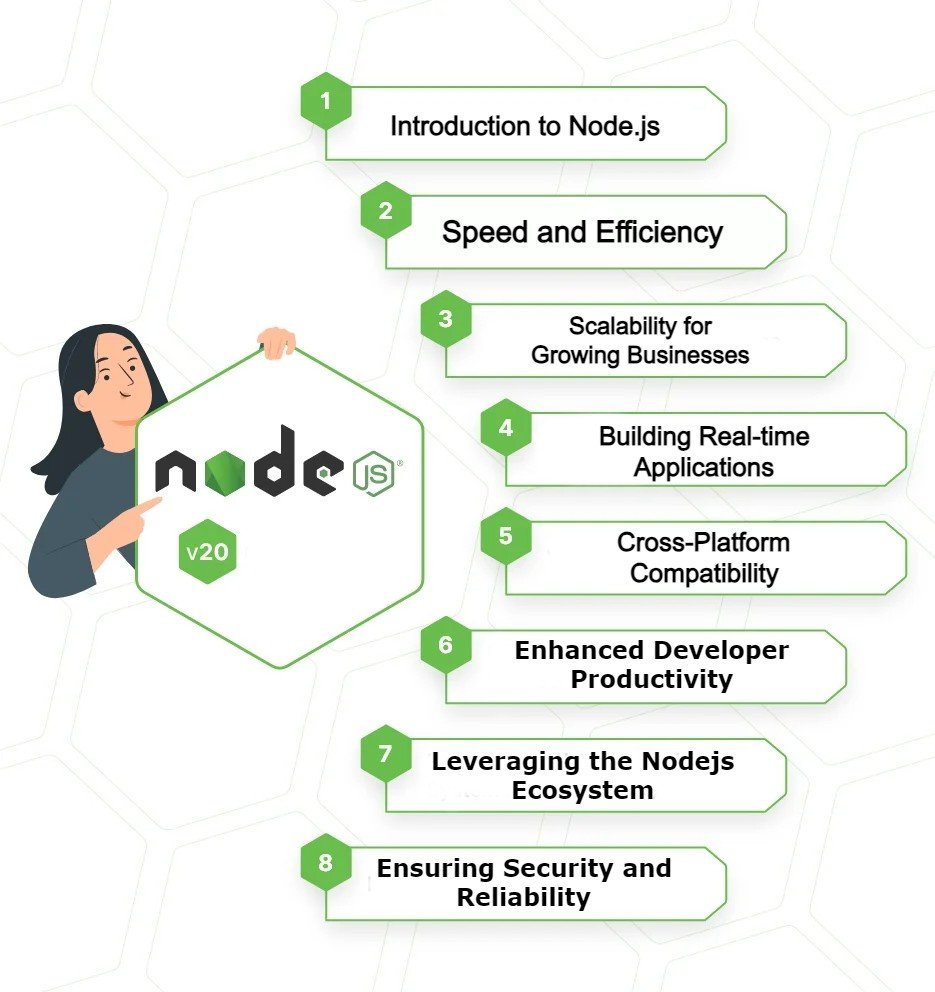In the fast-paced digital landscape, businesses are constantly seeking innovative technologies to drive growth and enhance their online presence. One such technology that has gained prominence in recent years is Node.js. This server-side JavaScript runtime is renowned for its efficiency and scalability, making it a preferred choice for businesses looking to stay ahead in the competitive market. This article will look at the ways that how Nodejs development company can help businesses grow more quickly by being a smart strategic choice.

1. Introduction to Node.js:
Overview:
Node.js is a runtime environment that executes JavaScript code on the server side. Its foundation lies in the V8 JavaScript engine, designed by Google for Chrome. This runtime allows JavaScript, traditionally associated with client-side scripting, to be used for server-side development, providing a unified language across the entire web application.
Event-Driven, Non-Blocking I/O:
Node.js employs an event-driven, non-blocking I/O model, allowing it to handle multiple events concurrently without waiting for each to complete. This architecture is well-suited for applications requiring high concurrency and responsiveness to a large number of simultaneous connections, making it particularly powerful for real-time applications.
Scalability and High Performance:
The event-driven, non-blocking nature of Node.js contributes to the creation of highly scalable and high-performance applications. Its ability to handle numerous concurrent connections efficiently is advantageous for scenarios where real-time responses are critical, such as in social media updates, live chats, or collaborative editing tools.
2. Harnessing Speed and Efficiency:
Asynchronous Nature:
Node.js achieves its exceptional speed through its asynchronous, non-blocking nature. In a traditional synchronous model, each operation must complete before moving to the next, causing delays. Node.js, however, can execute multiple tasks simultaneously, ensuring optimal resource utilization and faster execution.
Responsive Applications:
The asynchronous nature of Node.js makes it ideal for applications requiring quick responses to a large number of simultaneous requests. Dynamic content updates, common in social media feeds or live chat applications, benefit significantly from Node.js’s ability to handle concurrency efficiently, resulting in a more responsive user experience.
3. Scalability for Growing Businesses:
Modular Architecture:
Node.js boasts a modular architecture that allows for the easy addition or removal of modules. This modularity enhances the adaptability of Node.js to evolving business requirements, ensuring that it remains a viable technology solution as businesses expand.
Vertical and Horizontal Scalability:
Node.js supports both vertical and horizontal scalability. Vertical scalability involves enhancing the capabilities of a single server, while horizontal scalability involves distributing the load across multiple servers. This flexibility ensures that Node.js can scale seamlessly with the increasing demands of a growing user base.
4. Building Real-time Applications:
Event-Driven Architecture and WebSocket Support:
Node.js’s event-driven architecture, coupled with native support for WebSockets, facilitates bidirectional communication. This is crucial for real-time applications where instant updates and interactions are essential, such as in live chat platforms, online gaming, or collaborative editing tools.
Applications and Use Cases:
Real-time applications leverage Node.js to deliver instantaneous responses and updates. For instance, in live chat platforms, users can send and receive messages without delays, enhancing the overall user experience. Online gaming platforms benefit from the real-time capabilities of Node.js, ensuring seamless interactions between players.
5. Cross-Platform Compatibility:
Node.js Runtime for Various Platforms:
Node.js provides a runtime environment compatible with major operating systems, including Windows, macOS, and Linux. This cross-platform compatibility ensures that applications developed using Node.js can run consistently across diverse devices and operating systems.
Consistent User Experience:
Cross-platform development with Node.js ensures a consistent user experience regardless of the device or operating system. Businesses can reach a broader audience and accommodate diverse user preferences by leveraging Node.js’s capability to deliver a uniform experience across various platforms.
6. Enhanced Developer Productivity:
Unified Language:
Node.js promotes enhanced developer productivity through its use of JavaScript on both the client and server sides. This unified language approach reduces the learning curve and allows developers to apply their JavaScript skills seamlessly across the entire application stack.
Efficiency and Faster Development Cycles:
The consistency achieved through a unified language accelerates development cycles. Developers experienced in JavaScript can efficiently work on both front-end and back-end tasks, resulting in faster project delivery. A Nodejs Development Company benefits from this efficiency, providing clients with quicker turnaround times.
7. Leveraging the Nodejs Development Comany Ecosystem:
Rich Repository of Tools:
The Node.js ecosystem encompasses a vast repository of open-source libraries, frameworks, and modules. These tools cover a wide range of functionalities, from authentication mechanisms to database connectors, providing developers with pre-built solutions to common challenges.
Smart Utilization of Modules:
A proficient Nodejs Development Company intelligently leverages the existing modules within the ecosystem. By understanding the capabilities of these modules, developers can expedite development, reduce redundancy, and deliver projects more efficiently. This strategic use of tools contributes to shorter development cycles and cost-effectiveness.
8. Ensuring Security and Reliability:
Proactive Security Measures:
Node.js addresses security concerns through its active and vigilant community. Regular releases of updates and patches help mitigate vulnerabilities. A Nodejs Development Company places a strong emphasis on proactive security measures, ensuring that applications developed are resilient against potential threats.
Best Practices and Security Audits:
A reputable Nodejs Development Company employs best practices in secure coding and conducts thorough security audits. These audits involve analyzing code for vulnerabilities, implementing encryption protocols, and ensuring that the application follows security best practices. This commitment to security not only protects the business and its users but also contributes to the overall reliability of the solutions delivered.
REAd MORE: How To Hire the Best React Native App Developer for Your Next Project
Conclusion:
In conclusion, harnessing the power of Node.js through collaboration with a leading Nodejs Development Company can be a strategic move for businesses aiming to drive growth and stay competitive. The technology’s speed, scalability, real-time capabilities, cross-platform compatibility, and a vibrant ecosystem make it an ideal choice for modern applications. As businesses navigate the digital landscape, embracing Node.js can provide the edge needed to deliver innovative solutions, engage users effectively, and achieve sustained business growth.
